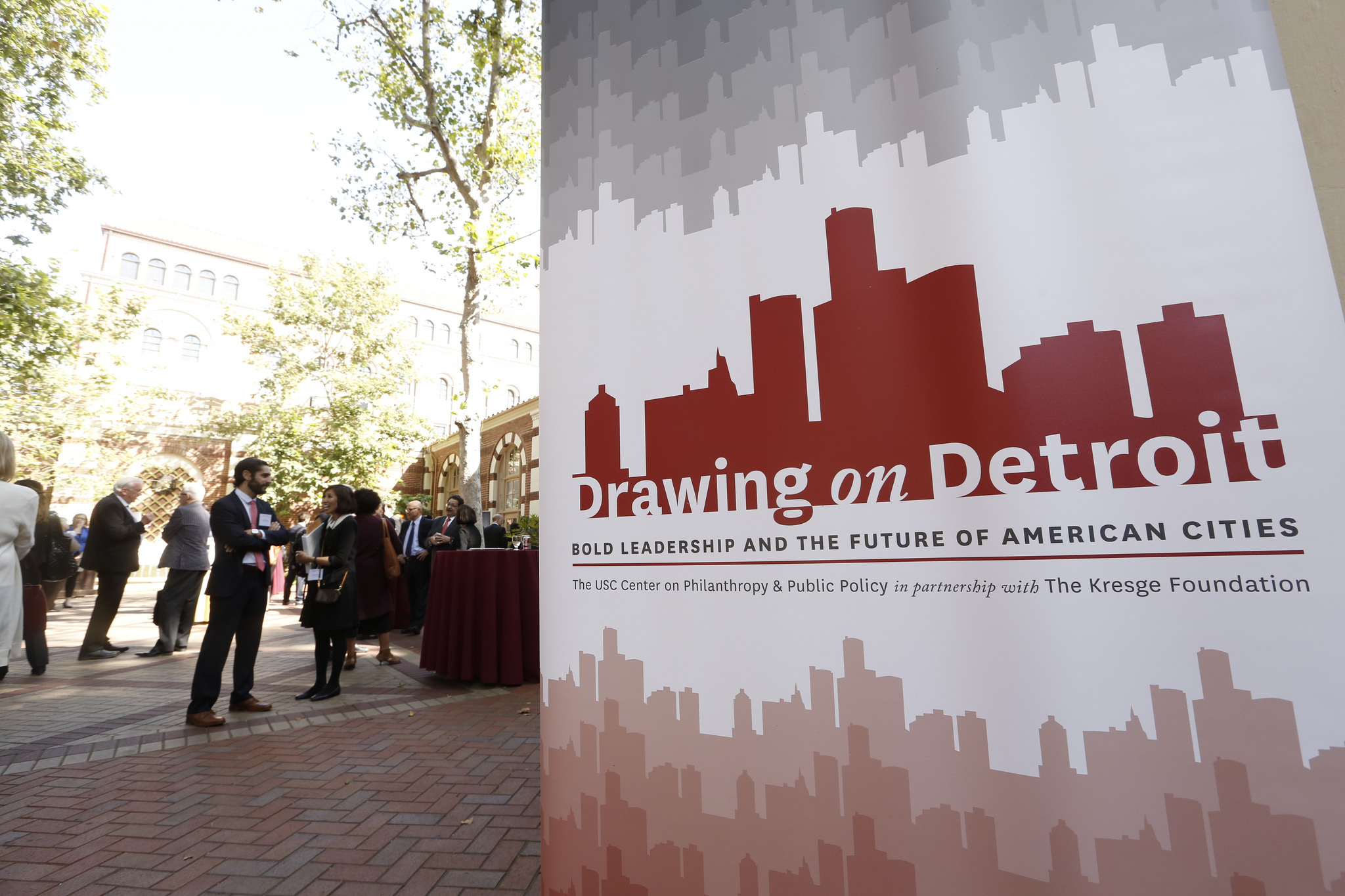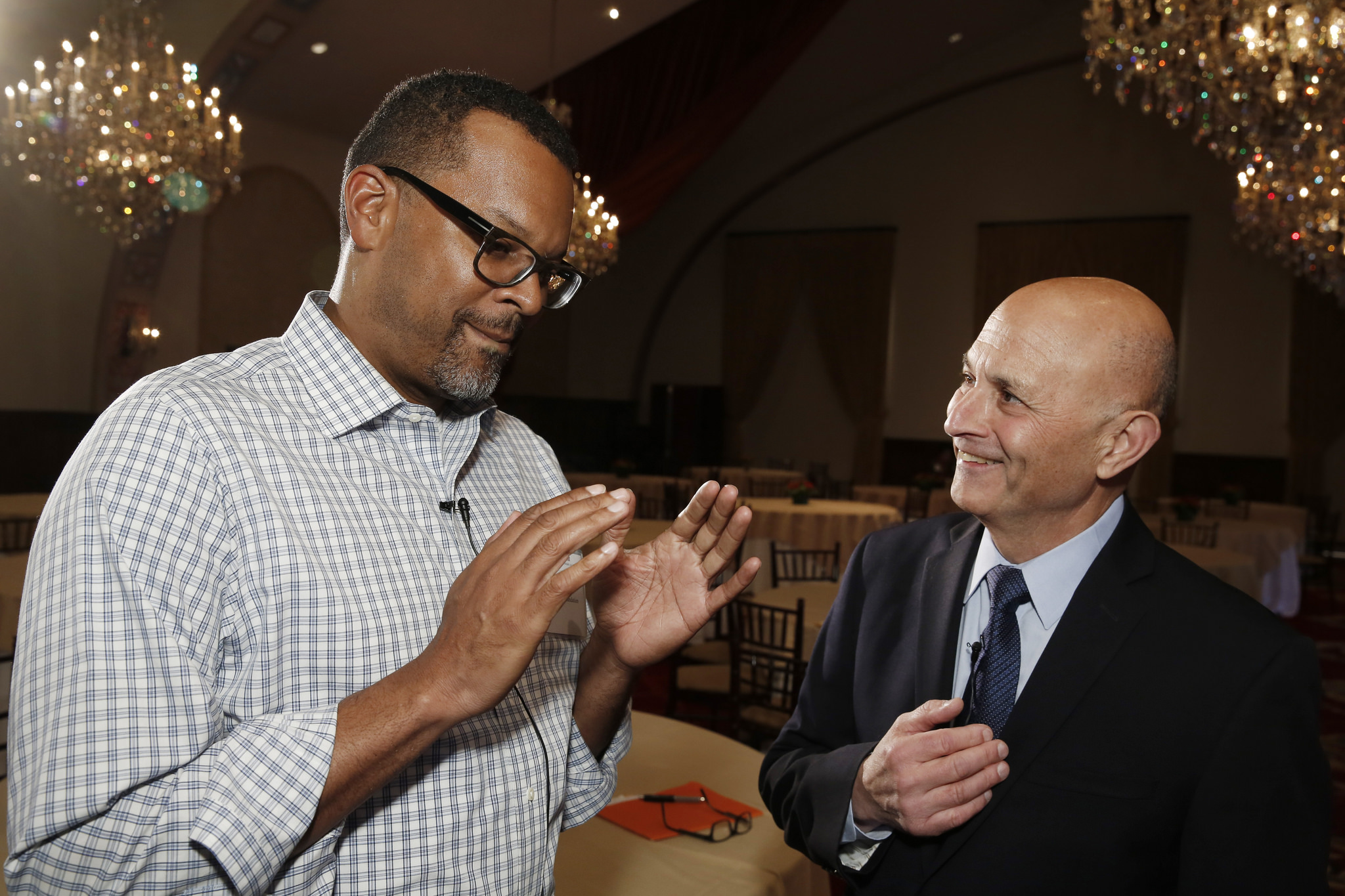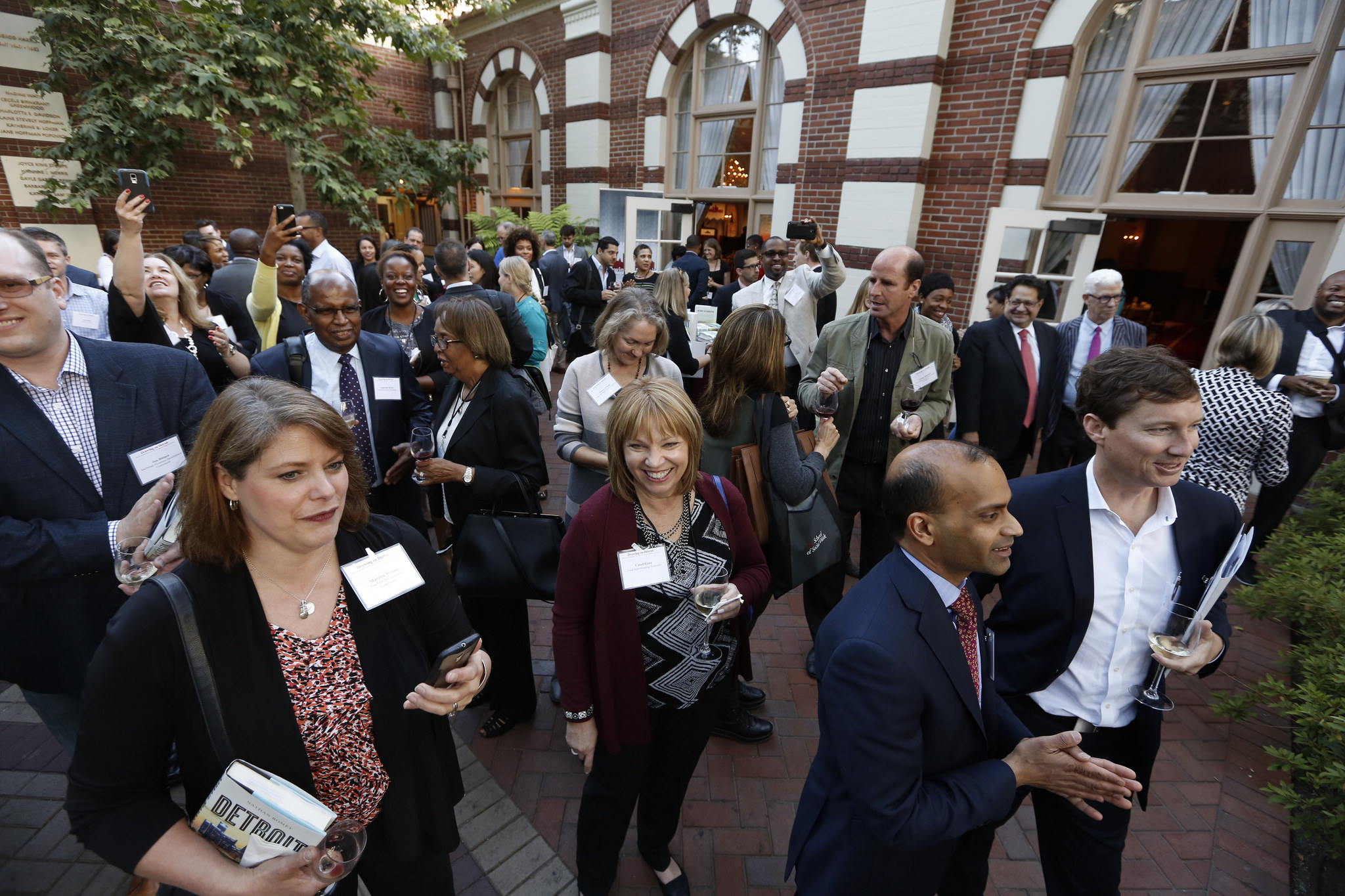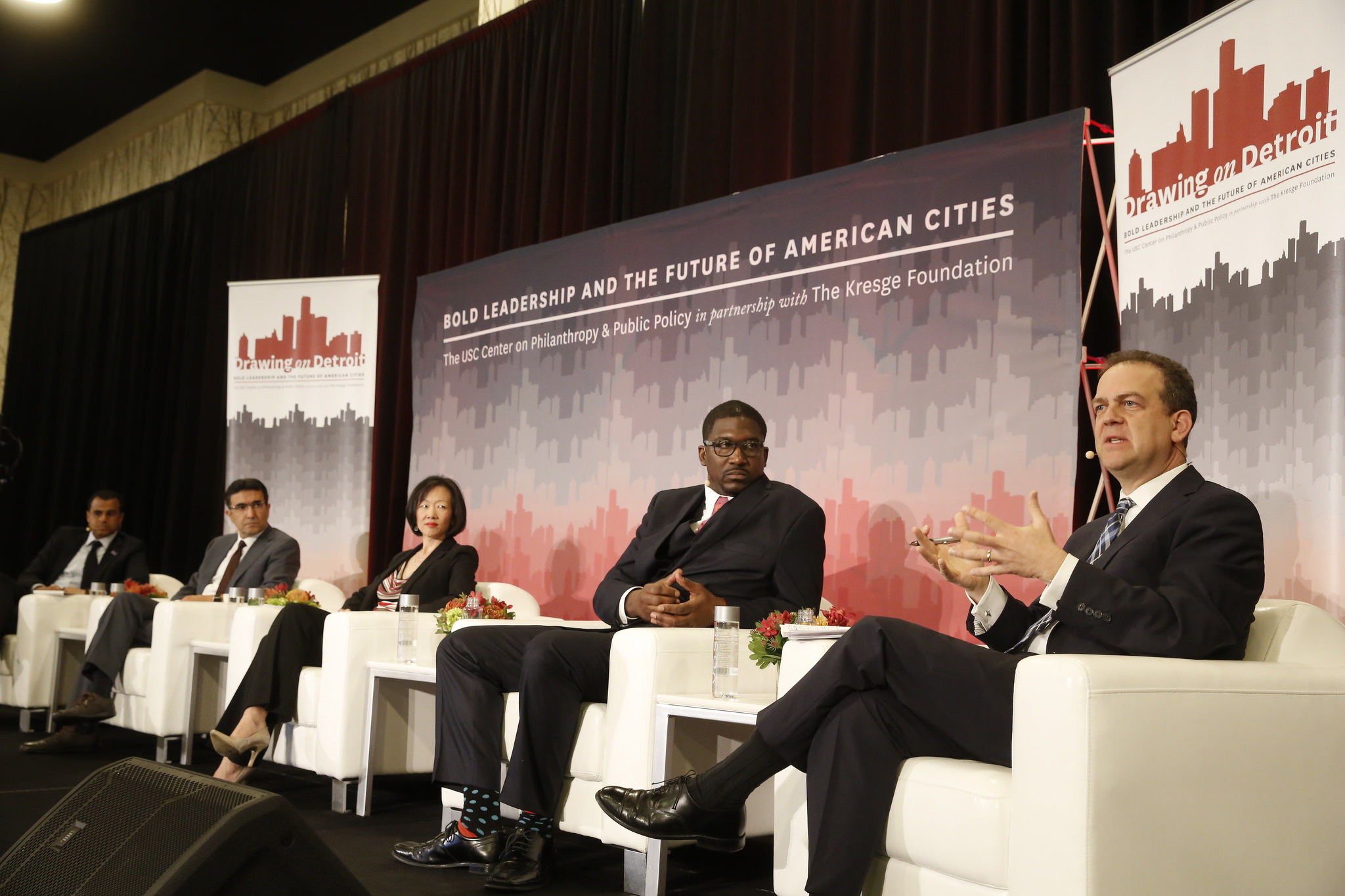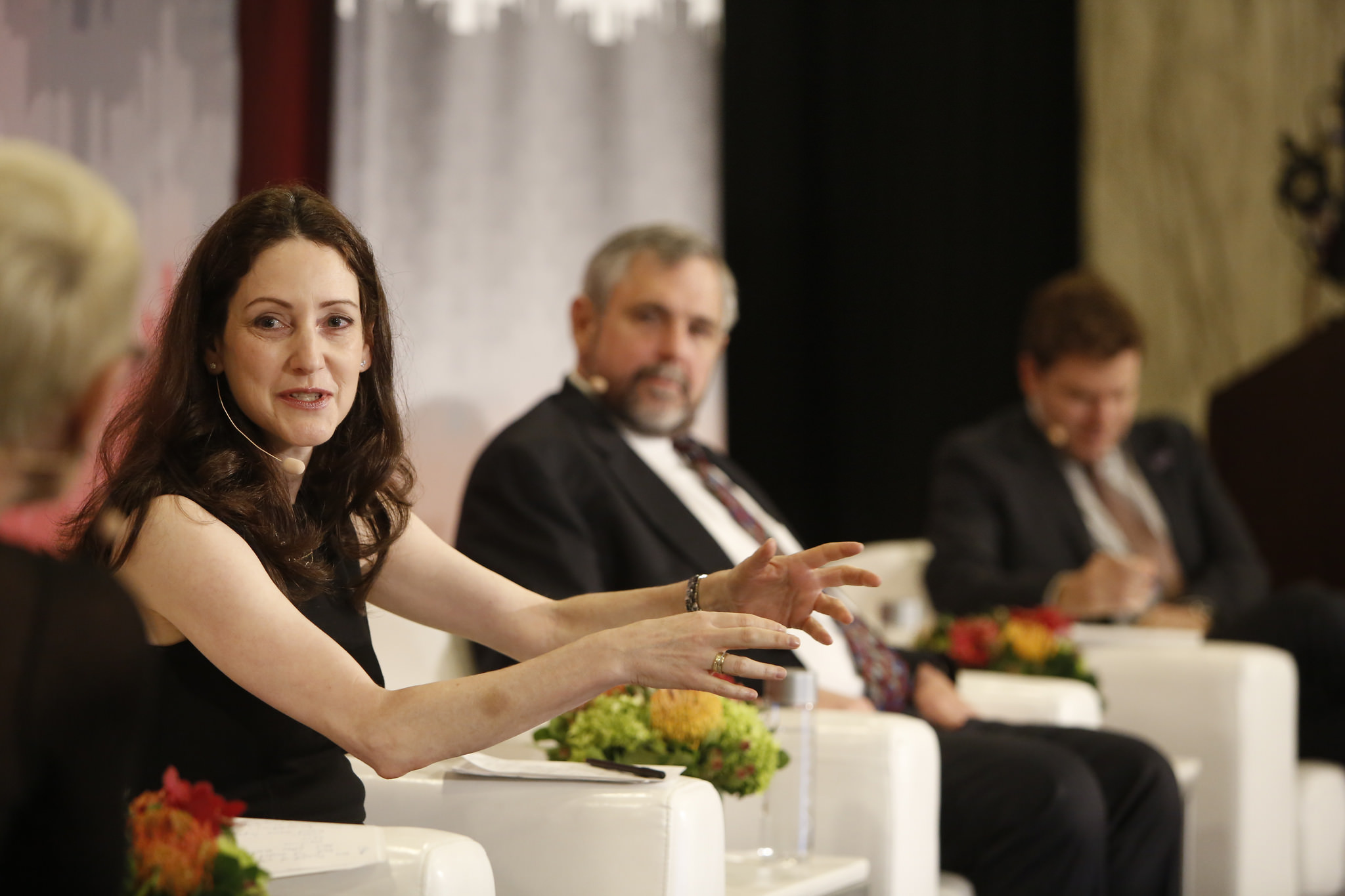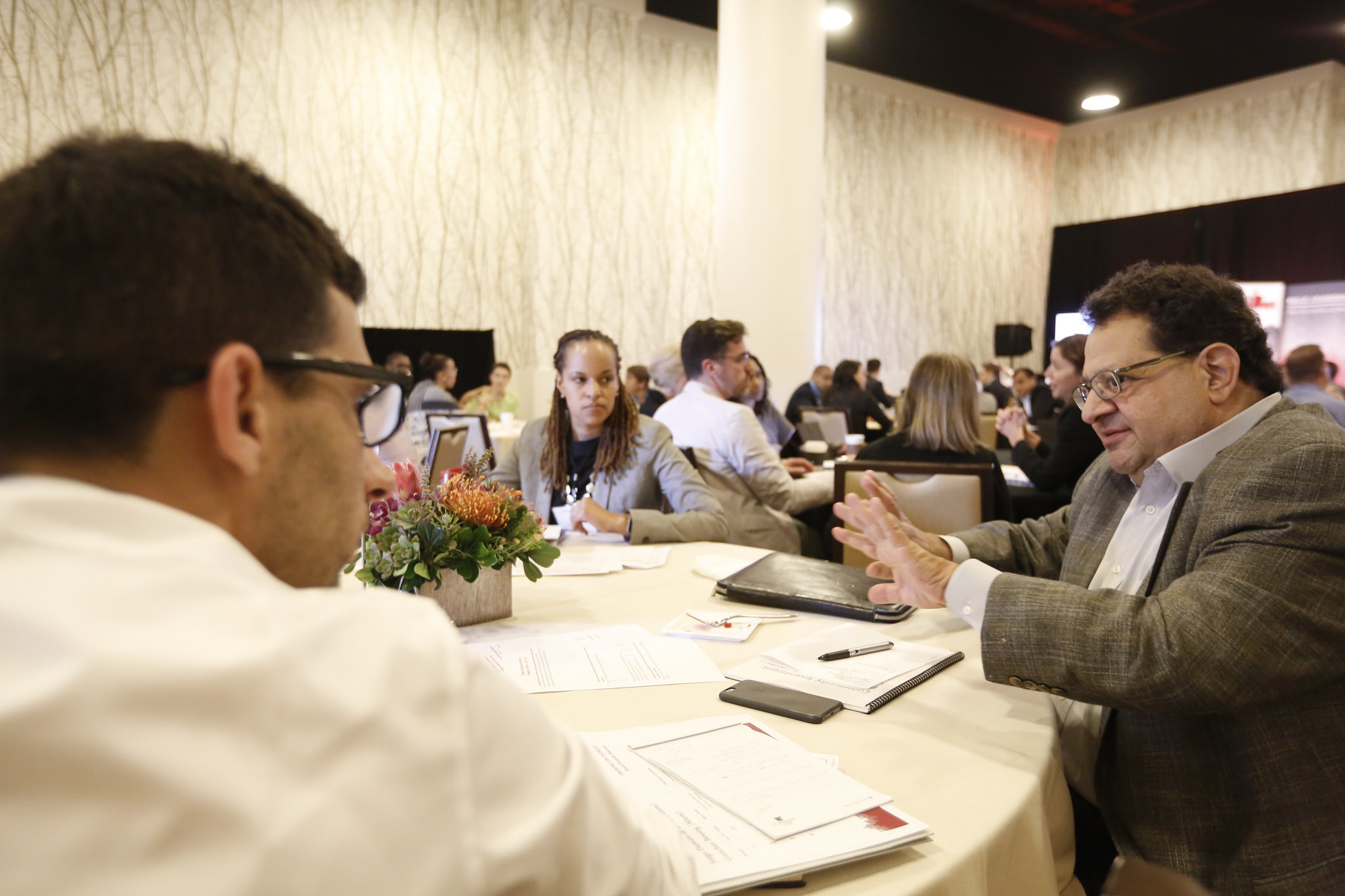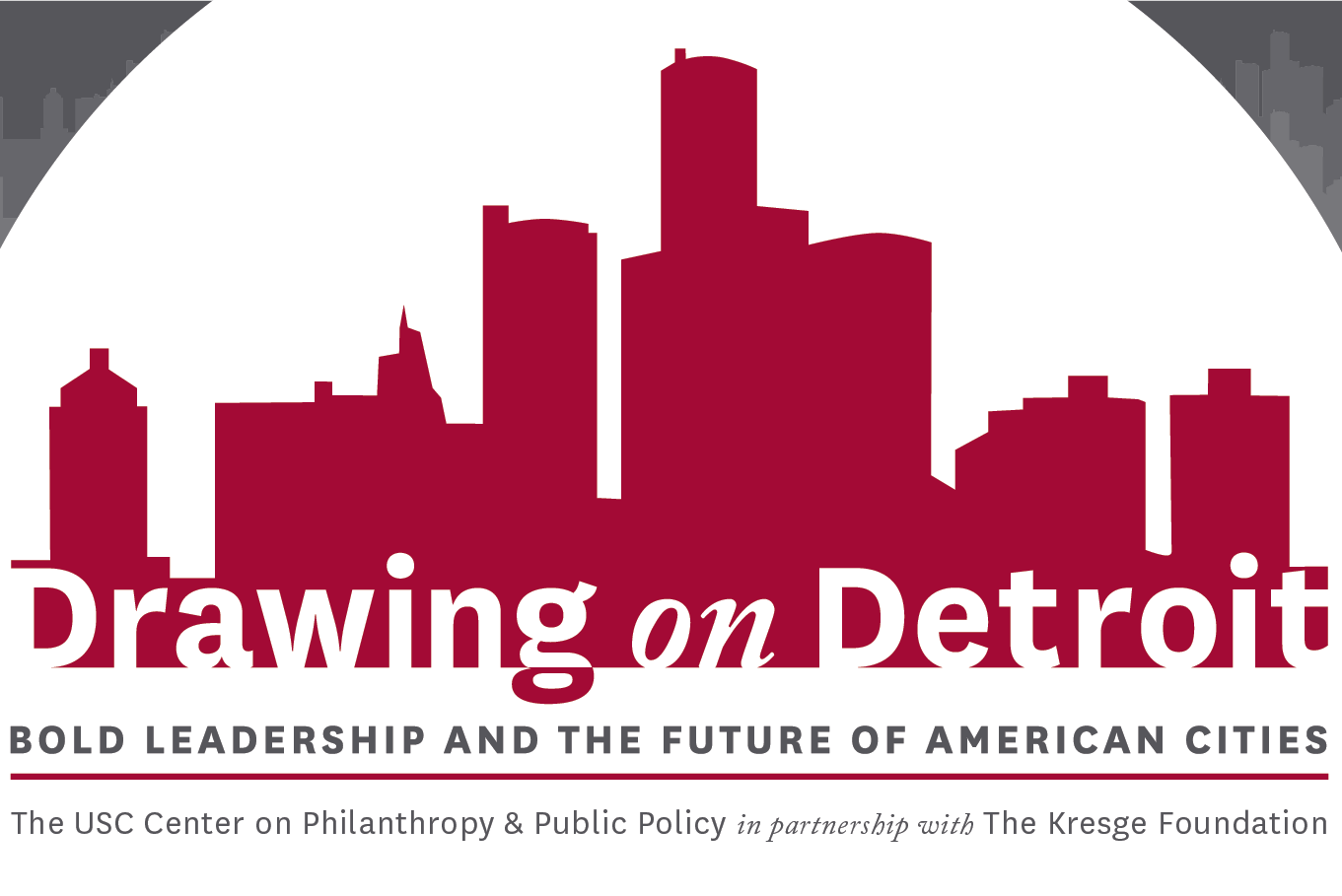
The Center on Philanthropy and Public Policy at the University of Southern California, in partnership with The Kresge Foundation, has undertaken an inquiry into the revitalization of cities in 21st century America.
Drawing explicitly on Detroit—and considering how approaches there might benefit other cities facing similar urban challenges—policy makers, thought leaders, and practitioners met for an important discussion exploring:
- The enabling conditions necessary to help stabilize cities and neighborhoods;
- Tactics that build economic, social and political momentum;
- How philanthropy, the nonprofit sector and government can ignite partnerships and investments that create lasting change; and
- Emerging leadership models for urban transformation.
The forum took place in downtown Los Angeles on May 4-5, 2016.
Philanthropy’s Catalytic Role
How can philanthropy catalyze cross sector collaboration in Detroit and other cities? What is the role of philanthropy in setting a bolder, more imaginative vision for the future of cities? What implications for philanthropy, government, business and the community as a result of this work?
Moderator
Fred Ali, President and CEO, Weingart Foundation
Panelists
Fred Blackwell, CEO, The San Francisco Foundation
Kathryn Merchant, Consultant and Former President and CEO, The Greater Cincinnati Foundation
Grant Oliphant, President, The Heinz Endowments
DINNER KEYNOTE: Drawing on Detroit
What may be illustrative for other cities to learn about what happened in Detroit and where it is heading today? What are the implications for other cities and their leaders to consider?
Introductions
Jack H. Knott, Dean, Sol Price School of Public Policy, USC
Reflections & Conversations
Rip Rapson, President and CEO, The Kresge Foundation
Kevyn Orr, Partner, Jones Day, and Former Emergency Manager, City of Detroit
Enabling Environments and Timelines for Change
What are the enabling conditions that are paving the way for a turnaround in Detroit and other cities? What is required to sustain the arc of growth as cities stabilize and achieve work towards a new equilibrium?
Moderator
Carol Coletta, Senior Fellow, The Kresge Foundation
PANELISTS
Jill Blickstein, Managing Director, Corporate Responsibility, JPMorgan Chase
George McCarthy, President, Lincoln Institute of Land Policy
Ariel Simon, Vice President, Chief Program and Strategy Officer, The Kresge Foundation
Presentations: Lessons from Detroit
What are some of the specific strategies and organizational structures that have emerged in Detroit to address planning, entrepreneurship and the creative economy, and how they relate to approaches and practices found in other cities?.
Moderator
Wendy Jackson, Interim Managing Director, Detroit Program, The Kresge Foundation
Land Use 
Panelists
Anika Goss-Foster, Executive Director, Detroit Future City Implementation Office
Toni Griffin, Founder, Urban Planning for the American City and Professor in Practice, Harvard Graudate School of Design
Economic Development 
Panelists
Michael Forsyth, Motor City Match Program Manager, Revolve Detroit
Teresa Lynch, Principal, Mass Economics
Placemaking 
Panelists
Dan Carmody, President, Eastern Market Corporation
Jamie Bennet, Executive Director, ArtPlace America
Breakout Sessions: Lessons from Detroit
What are some of the specific strategies and organizational structures that have emerged in Detroit to address planning, entrepreneurship and the creative economy, and how they relate to approaches and practices found in other cities?.
Land Use 
Moderator
Wendy Jackson, Interim Managing Director, Detroit Program, The Kresge Foundation
Panelists
Anika Goss-Foster, Executive Director, Detroit Future City Implementation Office
Toni Griffin, Founder, Urban Planning for the American City and Professor in Practice, Harvard Graudate School of Design
Economic Development 
Moderator
Chantel Rush, Special Assistant to the President, The Kresge Foundation
Panelists
Michael Forsyth, Motor City Match Program Manager, Revolve Detroit
Teresa Lynch, Principal, Mass Economics
Placemaking 
Moderator
Carol Coletta, Senior Fellow, The Kresge Foundation
Panelists
Dan Carmody, President, Eastern Market Corporation
Jamie Bennet, Executive Director, ArtPlace America
Building Economic Flywheels
What is helping to spark economic momentum in Detroit and other turnaround cities? What forms is revitalization taking? How can the resulting economic growth be shared most equitably?
Moderator
Benjamin Kennedy, Interim Managing Director, Detroit Program & Managing Director, American Cities Project, The Kresge Foundation
Panelists
Omar Blaik, CEO and Co-Founder, U3 Advisors
Amy Liu, Vice President and Director, Metropolitan Policy Program, The Brookings Institution
Rodrick Miller CEO, Detroit Economic Growth Corporation
Dan Nissenbaum Managing Director, Urban Investment Group, Goldman Sachs
Bold Urban Leadership
What are the new styles of leadership within and across sectors that are helping to lead these efforts? What is needed to cultivate new leaders or create new networks of leaders in other American cities?
Moderator
Sarah Wartell, President, Urban Institute
Panelists
Matt Cullen, President and CEO, Rock Ventures LLC
Derek Douglas, Vice President for Civic Engagement, University of Chicago
Marc Morial, President, National Urban League
Annise Parker, Resident Fellow, Harvard Kennedy School of Government and Former Mayor, Houston
Please contact [email protected] for additional information.
Speakers
Fred Ali
President and CEO, Weingart Foundation
Jaime Bennett
Executive Director, ArtPlace America
Fred Blackwell
CEO, The San Francisco Foundation
Omar Blaik
CEO & Co-Founder, U3 Advisors
Jill Blickstein
Managing Director, Corporate Responsibility, JPMorgan Chase
Dan Carmody
President, Eastern Market Corporation
Carol Coletta
Senior Fellow, The Kresge Foundation
Matthew Cullen
President and CEO, Rock Ventures LLC
Derek Douglas
Vice President for Civic Engagement, University of Chicago
James M. Ferris
Director, The USC Center on Philanthropy and Public Policy
Michael Forsyth
Motor City Match Program Manager, REVOLVE Detroit
Anika Goss-Foster
Executive Director, Detroit Future City Implementation Office
Toni L. Griffin
Founder, Urban Planning for the American City, and Professor in Practice, Harvard Graduate School of Design

Robin Hacke
Senior Fellow, The Kresge Foundation
Elwood Hopkins
Founder and Managing Director, Emerging Markets, Inc
Wendy Lewis Jackson
Interim Co-Managing Director, Detroit Program, The Kresge Foundation
Benjamin Kennedy
Interim Co-Managing Director, Detroit Program, and Managing Director, American Cities Project, The Kresge Foundation
Jack H. Knott
Dean, Sol Price School of Public Policy, USC
Amy Liu
Vice President and Director, Metropolitan Policy Program, The Brookings Institution
Teresa Lynch
Principal, Mass Economics
George McCarthy
President, Lincoln Institute of Land Policy
Kathryn Merchant
Consultant and Former President and CEO, The Greater Cincinnati Foundation
Rodrick Miller
CEO, Detroit Economic Growth Corporation
Marc H. Morial
President, National Urban League
Daniel Nissenbaum
Managing Director, Urban Investment Group, Goldman Sachs
Grant Oliphant
President, The Heinz Endowments
Kevyn Orr
Partner, Jones Day, and Former Emergency Manager, City of Detroit
Annise Parker
Resident Fellow, Harvard Kennedy School of Government and Former Mayor, Houston
Rip Rapson
President and CEO, The Kresge Foundation
Ariel Simon
Vice President, Chief Program and Strategy Officer, The Kresge Foundation
Fred Ali
Fred Ali is the President and Chief Executive Officer of the Weingart Foundation, a private foundation that supports nonprofit organizations in more effectively addressing the needs of low-income and underserved individuals and communities in Southern California. Prior to his appointment to the Foundation in 1999, Fred held senior leadership positions with non-profit organizations, educational institutions, and government agencies.
Fred serves on the Board of Grantmakers for Effective Organizations, and the Board of the Los Angeles Mayor’s Fund. He also chairs the Board of the Center on Philanthropy and Public Policy, University of Southern California. He is a senior Fellow at the UCLA Luskin School of Public Affairs.
Jamie Bennett
Jamie Bennett has been the Executive Director of ArtPlace America since January 2014. Previously, Jamie served as Chief of Staff at the National Endowment for the Arts and Chief of Staff at the New York City Department of Cultural Affairs. He has also provided strategic counsel at the Agnes Gund Foundation; served as chief of staff to the President of Columbia University; and worked in fundraising at The Museum of Modern Art, the New York Philharmonic, and Columbia College. His past nonprofit affiliations have included the Board of Directors of Art21 and the HERE Arts Center; the Foot-in-the-Door Committee of the Merce Cunningham Dance Foundation; and Studio in a School’s Associates Committee. Jamie received his B.A. from Columbia College in New York City.
Fred Blackwell
Fred Blackwell is a visionary leader working to ensure shared prosperity, innovation, and equity in the Bay Area. As CEO of The San Francisco Foundation, he leads one of the largest community foundations in the country, working hand-in-hand with donors, nonprofits, community leaders, business, and government partners in philanthropy to identify, influence, and leverage best practices and long-term solutions to make a greater impact in our community.
Blackwell is a nationally recognized community leader with a longstanding career in the Bay Area. Prior to joining the Foundation, he served as Interim City Administrator for the City of Oakland where he previously served as the Assistant City Administrator. He was the Executive Director of the San Francisco Redevelopment Agency and Director of the Mayor’s Office of Community Development in San Francisco; served as the Director of the Making Connections Initiative for the Annie E. Casey Foundation in the Lower San Antonio neighborhood of Oakland; was a Multicultural Fellow in Neighborhood and Community Development at The San Francisco Foundation; and subsequently managed a multi-year comprehensive community initiative for TSFF in West Oakland.
Blackwell currently serves on the board of the San Francisco Bay Area Super Bowl 50 Legacy Fund, UC Berkeley’s College of Environment Dean’s Advisory Council, and as an advisor for Google Impact Challenge: Bay Area. He previously served on the boards of California Redevelopment Association, Urban Habitat Program, LeaderSpring, SPUR and Leadership Excellence. He holds a Master’s degree in City Planning from UC Berkeley and a Bachelor’s degree in Urban Studies from Morehouse College.
Omar Blaik
Omar Blaik is co-CEO of U3 Advisors. Omar founded U3 Ventures LLC, a predecessor of today’s firm, in 2006 with the belief that anchor institutions hold the key to sustainable community and economic development in many cities across the country. Omar leads the advisory and development efforts of U3 Advisors, working with university leaders, city and state governments, non-profit foundations, and real estate developers to provide expertise on institutional anchor strategy, campus edge planning, local economic development, and place-based real estate strategy. He has had the privilege of advising senior leadership from foundations such as the Kresge Foundation and the John S. and James L. Knight Foundation, and from institutions such as the University of Maryland College Park and the University of Chicago, creating strategies around real estate, community engagement, and economic development.
Prior to forming U3 Ventures, Omar was the Senior Vice President of Facilities and Real Estate at the University of Pennsylvania. Under his management, Penn embarked on more than $2.0 billion of construction and real estate developments that transformed both the campus and the surrounding community.
Omar received his Bachelor of Science degree from Cairo University, his Master of Science degree in Civil Engineering from the University of Southern California, and his MBA from New York University’s Leonard Stern School of Business.
Omar is a founding member of ULI’s University Development Council, and a member of CEOs for Cities and the Institute for Urban Design. He also serves on the Advisory Council of the Community Design Collaborative.
Jill Blickstein
Jill Blickstein is Managing Director and Head of Strategy for Corporate Responsibility at JPMorgan Chase, which includes Global Philanthropy, Global Government Relations and Public Policy, and Sustainable and Social Finance. In this role, Jill leads strategy for the philanthropic investments of the JPMorgan Chase Foundation, one of the largest corporate foundations in the United States. She is responsible for ensuring a strong connection between the firm’s global philanthropic strategy, Corporate Responsibility mission and the work of our businesses, deepening the impact o four work in communities and around the world.
In 2014, Jill led the development of JPMorgan Chase’s $100 million commitment to Detroit, which uniquely brings together the firm’s scale and expertise to help the city regain its economic strength. As part of this initiative, one of the firm’s most ambitious to date, Jill led a cross-firm team to develop the strategy for the five-year program. Jill also led the strategic development of other significant Corporate Social Responsibility initiatives including the Global Cities Initiative, a partnership with the Brookings Institution to help metropolitan regions become more competitive in the global economy, and New Skills at Work, the firm’s $250 million initiative to strengthen workforce systems globally.
Jill brings more than 20 years of federal policy experience in her role at JPMorgan Chase. Prior to joining the firm in 2009, she served as Chief of Staff at the Office of Management and Budget. She held several leadership roles at Fannie Mae, where she was Vice President for Regulatory Policy and Assistant to the Chairman and CEO. Earlier in her career, she worked at the Office of Management and Budget as a program examiner and as a Special Assistant to the Director.
Jill holds an AB degree in Public Policy from Duke University and a Masters in Public Policy from Harvard’s Kennedy School of Government.
Dan Carmody
Dan Carmody has thirty-five years of government, small business, and nonprofit management experience focused on economic revitalization, place making, and regional food systems in the downtowns, neighborhoods, and market districts of cities throughout the Midwest. He’s served as a city planner, succeeded as a tavern keeper, and has developed two different community-based development organizations into national models.
Between 1988 and 2005, Dan led Renaissance Rock Island, a consortium of nonprofit community and economic development groups that helped revive an Illinois community devastated by the mid-1980’s Rust Belt meltdown. Since 2007, he has led Eastern Market Corporation, a non-profit that is redefining the role of public markets and food hubs in the development of regional food systems and jobs creation.
Since the mid-1990’s Dan has also served as a consultant to more than forty community development programs across North America and served on the board of directors of the International Downtown Association. He frequently presents at place making, economic development, and food conferences.
Dan’s key competencies include real estate development, organizational capacity building, strategic planning, coordinating complex agendas, partnership development, regional cooperation, marketing, and special event programming.
He has engaged in a wide range of participative community design and planning processes including organizing study trips, resource team visits, and community charettes. Current interests include food systems project planning, mixed-use and mixed-income development, and strategic planning for communities and organizations looking for a compelling vision for the future.
Dr. John E. Deasy
Dr. John E. Deasy, who led improvements that propelled student achievement and high school graduation rates to historic levels in the nation’s second-largest school district, consults for The Broad Center for the Management of School Systems as a superintendent-in-residence. In this role, John provides executive coaching to Center alumni leading urban public school systems as well as facilitates professional development sessions for The Broad Academy. Most recently, Deasy was superintendent of the Los Angeles Unified School District, where he championed a “youth first” agenda credited with reversing the district’s school-to-prison pipeline, raising achievement and helping more students graduate ready for college and the workplace. Deasy previously served as superintendent in Prince George’s County Public Schools in Maryland, Santa Monica-Malibu Unified School District in California and Coventry Public Schools in Rhode Island. He was named Superintendent of the Year in 2001 by the Rhode Island School Superintendents’ Association. A former high school principal, Deasy focused school improvement efforts on child-centered, outcomes-based practices, including alternative assessment, school-to-work transition programs and interdisciplinary instruction.
Carol Coletta
Carol Coletta has been named Senior Fellow at The Kresge Foundation. There she will lead a proposed $40+ million collaboration of national and local foundations, local nonprofits and governments to Reimagine the Civic Commons in five cities. It is planned as the first comprehensive demonstration of how a connected set of civic assets – a civic commons – can yield increased and more widely share prosperity for cities and neighborhoods.
She was formerly vice president of Community and National Initiatives for the John S. and James L. Knight Foundation where she managed a portfolio of more than $50 million annually in grants and a team of 18 in 10 communities to drive success in cities.
Carol led the two-year start-up of ArtPlace, a unique public-private collaboration to accelerate creative placemaking in communities across the U.S. and was president and CEO of CEOs for Cities for seven years.
Previously, she served as executive director of the Mayors’ Institute on City Design, a partnership of the National Endowment for the Arts, U.S. Conference of Mayors and American Architectural Foundation. She also ran a Memphis-based public affairs consulting firm, Coletta & Company, where she served business, foundations, nonprofits and government on the broadest range of civic issues.
For nine years, she was host and producer of the nationally syndicated weekly public radio show Smart City, where she interviewed more than 900 international leaders in business, the arts, and cities.
Matthew Cullen
Matthew P. Cullen is president and CEO of Rock Ventures LLC, the umbrella entity formed to provide operational coordination, guidance, and integration to Dan Gilbert’s portfolio of more than 110 companies and investments. Cullen is also responsible for Rock Venture’s efforts to spark development and revitalization in the City of Detroit, which includes Quicken Loans’ national headquarters move to the city in 2010. Since then, Cullen has managed the investment in and redevelopment of more than $2.2 billion in real estate in Detroit’s Central Business District, which has been a catalyst for attracting new businesses, workers and residents to the city. In addition, Cullen is CEO of JACK Entertainment LLC, a Detroit-based urban gaming company focused on the development of gaming facilities that are designed to maximize connectivity and economic impact in the local areas where they reside.
Cullen is a 29-year veteran of General Motors (GM), where he was general manager of economic development and enterprise services. In addition to coordinating economic development initiatives in the communities in which GM operates, he created a shared services organization and had responsibility for the corporation’s vast 450 million sq. ft. global real estate portfolio. Cullen was chief architect of GM’s $500 million acquisition and development of the Renaissance Center as the automaker’s global headquarters. Since 2003 he has helped oversee the billion dollar redevelopment of the city’s international riverfront as the founding chairman of the Detroit RiverFront Conservancy.
Cullen earned a degree in economics from the University of Michigan and an MBA from the University of Detroit Mercy. He also completed the Senior Executive Program at Harvard University.
Derek Douglas
Derek R.B. Douglas joined the University of Chicago in January 2012 as the Vice President for Civic Engagement. In this role, he leads the University’s local, national, and international urban development and civic engagement efforts. He also spearheads the University’s efforts to work in partnership with the surrounding South Side neighborhoods, city, region, nation, and globe to advance urban economic development, enhance the quality of life for residents, and enrich the work of University faculty and students through research, education, and direct engagement.
From 2009 through 2011, Douglas served on the White House Domestic Policy Council (DPC) as Special Assistant to President Barack Obama, where he led the DPC’s work on urban and metropolitan policy issues. Prior to working in the White House, Douglas served as Washington Counsel to New York Governor David A. Paterson and Director of Governor Paterson’s Washington, D.C. office. In this capacity, Douglas served as the Governor’s chief architect for federal policy and oversaw federal policy development and advocacy on domestic, economic, and urban policy issues for the State of New York.
Douglas also served as Associate Director of Economic Policy at the Center for American Progress where he founded and served as Director of the Economic Mobility Program. Before joining the Center, Douglas was a Counsel at O’Melveny & Myers LLP and an Assistant Counsel at the NAACP Legal Defense and Educational Fund.
Douglas graduated from the University of Michigan with Highest Honors in Economics and from the Yale Law School.
James M. Ferris
James M. Ferris is the founding Director of The Center on Philanthropy and Public Policy at the University of Southern California. He is a Professor in the Sol Price School of Public Policy and holds the Emery Evans Olson Chair in Nonprofit Entrepreneurship and Public Policy. He specializes in the economics of the public and nonprofit sectors, public finance and public policy and is a Fellow of the National Academy of Public Administration.
Dr. Ferris’ research focuses on the shifting roles of the public, nonprofit and for-profit sectors in governance and the economy. He is currently investigating the changing landscape of philanthropy; roles and strategies for foundation engagement in public policymaking; philanthropic-government partnerships; and place-based philanthropy.
Dr. Ferris serves as a member of the Nonprofit Policy Forum editorial board. He has served as on the Independent Sector’s Programs and Practice Committee and the Philanthropy and Partnerships Committee of the National Park Service and the boards of Nonprofit and Voluntary Sector Quarterly and the Journal of Public Administration and Theory, including a stint as a founding Associate Editor. In addition, he is a former Vice President of the Association for Research on the Nonprofits and Voluntary Association, and was a member of the Grants Advisory Committee of the Aspen Institute’s Nonprofit Sector and Philanthropy Research Fund, the academic council of the National Center on Nonprofit Enterprise, and the Independent Sector’s John Gardner Award Selection Committee.
Dr. Ferris has served as Vice Dean (1995-97) of the Price School and as the founding Director of its Program in Public Policy (1989-93) where he was responsible for initiating, building and developing the Master in Public Policy degree program. More recently, he spearheaded the development of the Master’s degree in Nonprofit Leadership and Management which was launched in 2015. Professor Ferris teaches courses in public policy, philanthropy and nonprofits, public finance, and political economy of institutions at both the undergraduate and graduate levels.
Michael Forsyth
Michael Forsyth is the Small Business Director with the Detroit Economic Growth Corporation. Michael has designed and managed two cutting edge programs, Motor City Match and REVOLVE Detroit to facilitate entrepreneurship, real estate development and arts investment in Detroit’s neighborhood business districts.
Michael is also a founding partner and owner of Detroit City Distillery in Eastern Market. The small distillery and tasting room opened in fall of 2014 and makes small batch whiskies, gins and vodkas.
Prior to his work in Detroit, Michael studied temporary use and in Germany’s post-industrial cities and joined a Seattle consulting firm where he led a range of economic development projects. Michael attended Michigan State University where he earned a degree in Environmental Studies and a master’s in Urban Planning.
Anika Goss-Foster
Anika Goss-Foster is the Executive Director of the Detroit Future City (DFC) Implementation Office. In this role, Anika leads a dynamic team of experts to implement the DFC Strategic Framework, the guide to decision-making and investment in Detroit. She also directs all partnerships, project initiatives, investments and funding opportunities for the DFC Implementation Office.
Anika worked at the Local Initiatives Support Corporation (LISC) for 15 years. In her most recent post as Vice President of the Midwest Region, Anika provided strategic and technical support for seven LISC offices in cities across the Midwest that are engaged in resident-led, comprehensive community development. Prior to this, Anika served as LISC’s Vice President of Sustainable Communities, where she supported 16 local offices’ efforts to implement comprehensive community development strategies as part of its Building Sustainable Communities program.
Anika’s experience in Detroit began with LISC as well, where she served as the organization’s Detroit program director; managing a $40 million community development campaign, and designing and leading the campaign for the city’s first Land Bank Authority.
Anika also worked with the City of Detroit as its Director of Philanthropic Affairs and Executive Director of Next Detroit Neighborhood Initiative, leading an effort to transform six Detroit neighborhoods by improving city services and incorporating redevelopment strategies through public-private partnerships.
Anika has a Master of Social Work in Community Organizing degree from the University of Michigan and a Bachelor of Sociology and African American Studies degree from Purdue University.
Toni L. Griffin
Toni L. Griffin is founder of Urban Planning for the American City, based in New York City. Through the practice, Toni served as Project Director for the Detroit Work Project Long Term Planning initiative, and released Detroit Future City, a comprehensive citywide framework for urban transformation. Current clients include the cities of Memphis, Milwaukee and Pittsburgh.
Toni was recently appointed to Professor in Practice of Urban Planning at the Harvard Graduate School of Design, where she will both teach and develop values-based planning methodologies through the Just City Design Lab. Toni is an architect ad urban planner, holding a degree from the University of Notre Dame and a GSD Loeb Fellowship.
Elwood Hopkins
Elwood Hopkins is an urban planner. He holds degrees in city and regional planning from Harvard University, where he graduated magna cum laude, and the UCLA Graduate School of Public Policy and Social Research. He is Founder and Managing Director of Emerging Markets, Inc., a consulting firm that helps supermarket chains and financial institutions open stores and branch locations in low-income neighborhoods. Clients include Bank of America, Wells Fargo, JPMorgan Chase, Citibank, Capital One, US Bank, Union Bank, as well as Kroger, Northgate Gonzalez, Numero Uno Markets, Fresh & Easy Neighborhood Markets, and Unified Grocers.
Elwood has served as a Research Scientist at the New York University Urban Research Center and has conducted extensive fieldwork in Bombay, Calcutta, Delhi, Bangkok, Beijing, Shanghai, Jakarta, Tokyo, Istanbul, Cairo, Nairobi, Lagos, Rio de Janeiro, and Mexico City. He has been an Advisor to the United Nations Development Programme (UNDP), Habitat (UNCHS), Organization of American States, and the World Bank. He was a contributor to the World Summit on Cities, UN Social Summit, and the UN Conference on Environment and Development (UNCED).
Domestically, he has served as Executive Director of Los Angeles Urban Funders, a foundation consortium established after the 1992 riots that targeted low-income neighborhoods for twelve years. He was a participant in the Harvard Executive Session on Philanthropy, and the Aspen Institute Roundtable on Comprehensive Community Building.
Wendy Lewis Jackson
As the Interim Co-managing Director of the Detroit Team, Wendy Lewis Jackson advances The Kresge Foundation’s effort to revitalize Detroit and strengthen the social and economic fabric of other large U.S. cities. Through grantmaking, the foundation supports organizations that work to provide economic opportunity for low-income people and address the needs of vulnerable children and families.
“We’re fortunate to work in cities that are at the crossroads of reinvention,” she says. “Every day I’m inspired by a quote on the wall in my office from Robert Storey, a former Kresge Foundation trustee, who said, ‘Detroit is Kresge’s greatest challenge and its greatest opportunity.’ I’m always focused on this opportunity.
Prior to joining Kresge in 2008, Wendy was a program director for Children and Family Initiatives and executive director for education initiatives at the Grand Rapid Community Foundation in Grand Rapids, Mich. She taught at Grand Valley State University in Allendale, Mich., and has co-authored and assisted in the publication of several reports and publications that address community needs and problem solving.
Wendy is an American Marshall Memorial Fellow of the German Marshall Fund of the United States; the Association of Black Foundation Executives named her an Emerging Leader in 2008. Wendy earned a bachelor’s degree in political science and communications from the University of Michigan. She also holds a master’s degree in social work from U-M, with a concentration in community organization and social policy and planning.
Benjamin Kennedy
Benjamin Kennedy joined The Kresge Foundation in 2009 and currently serves as Director of American Cities Project. In addition to grantmaking, he originates and structures program-related investments that support and advance Kresge’s strategic goals.
“Vibrant, livable and densely populated cities are essential to achieving economically sustainable and equitable patterns of global development,” Benjamin said. “Our work in Detroit advances this ideal in tangible and meaningful ways.”
Prior to joining Kresge, Benjamin was with JPMorgan Chase in Johannesburg, South Africa, as an associate on the firm’s mergers and acquisitions team. He also worked as an economic and political analyst within HIS Global Insight’s sub-Saharan Africa county intelligence group. His responsibilities include sovereign credit risk analysis, policy research and macroeconomic forecasting.
Benjamin earned a master’s in business administration from the Harvard Business School and a bachelor’s in economics from Morehouse College in Atlanta.
Jack H. Knott
Jack H. Knott serves as the dean of the USC Sol Price School of Public Policy and holds the C. Erwin and Ione L. Piper Chair. He is a leading scholar in the fields of public policy and public administration.
In recognition of his substantial contributions to the field of public administration, Knott was named a fellow of the National Academy of Public Administration in 2007.
Before joining USC, he served on the faculty of the University of Illinois at Urbana-Champaign where he directed the Institute of Government and Public Affairs. Before joining the University of Illinois, he was a professor at Michigan State University. He has held visiting professorships at the University of Arizona and the University of Warwick in the U.K, and fellowships at the Russel Sage Foundation in NYC and the Institute of Management in Berlin, Germany.
Knott earned a Ph.D. in political science from the University of California, Berkeley, a master of arts from the School of Advanced International Studies at Johns Hopkins University, and a bachelor of arts from Calvin College.
Amy Liu
Amy Liu serves as vice president and director of the Metropolitan Policy Program at the Brookings Institution. She is a national expert on cities and metropolitan areas adept at translating research and insights into action on the ground.
As senior fellow and co-director of the Metro Program, which Liu co-founded in 1996, she pioneered the program’s signature approach to policy and practice, which uses rigorous research to inform strategies for economic growth and opportunity. Liu has worked directly on such strategies with scores of public and private sector leaders in regions around the country, including Chicago, Kansas City, and Phoenix.
Liu also has extensive experience working with states and the federal government to develop policies and strategies to support cities and metropolitan areas. She co-authored “Delivering the Next Economy: The States Step Up,” outlining a model for states to support bottom-up regional innovation and put this into practice when she worked with New York Governor Andrew Cuomo and other state leaders to develop the New York Regional Economic Development Councils process, a pioneering model for regionalizing state economic development and incentivizing bottom-up innovation.
At the federal level, in 2013 Liu served as a special advisor to the U.S. Secretary of Commerce, guiding policy priorities related to trade, innovation, and data.
Teresa Lynch
Teresa M. Lynch is a Principal at Mass Economics, a research and consulting firm that works with the public, private, and philanthropic sectors to promote inclusive economic growth in American cities. The firm has offices in Cambridge and Oakland, and is nationally known for its work on inclusive economic growth, including broad-based cluster strategies, urban land issues, and the creation of models that link economic development and land strategies (e.g., employment districts, industrial corridors, and innovation districts). Prior to Mass Economics, Teresa was a Senior VP at the Initiative for a Competitive Inner City (ICIC) in Boston, where she led the organization’s research activities and a dozen consulting engagements with U.S. cities, including Detroit Future City. She was also part of the MIT research team that produced How We Compete: What Companies around the World Are Doing to Make it in Today’s Global Economy. She holds undergraduate degrees in Economics and Public Policy from UNC-Chapel Hill and a master’s in Regional Science from the University of Pennsylvania. Teresa is on the governing board of the Massachusetts Technology Collaborative Innovation Institute and is a founding board member of the Venture Café Foundation. She is a nonresident senior fellow at the Brookings Institution.
George McCarthy
George (“Mac”) W. McCarthy is President of the Lincoln Institute of Land Policy. His areas of expertise include housing and housing finance, global urbanization, economic forecasting, program evaluation, and regional planning. He has also served as Director of Metropolitan Opportunity at the Ford Foundation, seeking to reduce the social and spatial isolation of poor and disadvantaged populations within metropolitan areas. Before that he administered a Ford Foundation program on homeownership and wealth building for low-income communities. Previously, he was Senior Research Associate at the Center for Urban and Regional Studies at the University of North Carolina at Chapel Hill. He has also been Professor of Economics and Residents Scholar for many universities and research institutes around the world. He earned a Ph.D. in economics from the University of North Carolina at Chapel Hill, a master’s in economics from Duke University, and a bachelor’s in economics and mathematics from the University of Montana.
Kathryn Merchant
Kathy Merchant retired in 2015 as President and CEO of The Greater Cincinnati Foundation (GCF). Prior to joining GCF in 1997, Merchant was director of The Pew Charitable Trusts’ Neighborhood Preservation Initiative and a partner in the New Haven-based consulting firm Holt, Wexler & Merchant. Merchant currently serves on the national board of the Local Initiatives Support Corporation, and as Advisor to the national StriveTogether network. Previous board leadership includes the Center for Effective Philanthropy, Council on Foundations, Community Foundations of America/GivingNet, Ohio Grantmakers Forum, and SC Ministry Foundation. She has received the Northern Kentucky University Lincoln Award, Council on Foundations’ Distinguished Grantmaker, Ohio Philanthropy Award, Kentucky Commonwealth Award, Girl Scouts Woman of Distinction, YWCA Career Woman of Achievement, and Cincinnati PRSA Blacksmiths CEO Communicator of the Year. Merchant graduated with a bachelor’s from Indiana University and a master’s from the University of Connecticut in social work. She completed a Diploma in Wine & Spirits (DWS) from the London-based Wine & Spirit Education Trust, and a Certified Specialist of Wine (CWS) credential from the Society of Wine Educators (USA).
Rodrick Miller
Rodrick Miller is a results-oriented leader with over 10 years of experience in economic development, strategic planning, trade and foreign investment, and project finance. He has emerged as one of the foremost economic development leaders in the country, respected globally for his ability to maneuver in extraordinarily complex political and business environments, and craft strategies and structure deals to provide long-term value to communities and investors. Currently, Miller is serving as President & CEO of the Detroit Economic Growth Corporation (DEGC). The DEGC is a private, nonprofit corporation devoted exclusively to supporting Detroit’s economic development by providing technical, financial, negotiation, and development assistance to the City and the private sector business community. Previously, Miller served as the founding president and CEO of the New Orleans Business Alliance (NOLABA), the official economic development organization responsible for ensuring the long-term economic vitality and driving job growth for the City of New Orleans. Prior to that position, Miller served as the Executive Vice President of the Baton Rouge Area Chamber where he managed day-to-day operations, developed strategic initiatives, and helped deliver on the firm’s $20M capital campaign. Under his leadership, the Baton Rouge market was ranked the Number 1 Mid-Market for Deals in 2010 by Site Selection Magazine.
Miller holds a Master of Public Policy from Harvard University’s Kennedy School of Government and a Bachelor of Science degree in international business from St. Augustine’s College. He also gained a Graduate Diploma in Finance from the Monterrey Institute of Technology (ITESM) in Mexico while completing a Fulbright Fellowship.
Marc H. Morial
As the President of the National Urban League since 2003, Mark H. Morial has been the primary catalyst for an era of change. Hi skilled leadership has expanded the Leagues’s work around an Empowerment agenda, which is redefining civil rights in the 21st century with a renewed emphasis on closing the economic gaps between Whites and Blacks as well as rich and poor Americans. The former Mayor of New Orleans, Morial was elected in 1994 and served two terms leading the city into a 1990’s renaissance of international prominence. During his tenure, New Orleans won the All-American City Livability Award. He serves as an Executive Committee member of the Leadership Conference on Civil Rights.
Grant Oliphant
Grant Oliphant is president of The Heinz Endowments. He rejoined the foundation in June 2014, after serving as president and chief executive officer of The Pittsburgh Foundation for six years. Prior to this, Grant held several senior management posts with Heinz family foundations for two decades, including vice president for programs and planning at the Endowments. He also served as press secretary to the late U.S. Sen. John Heinz from 1988 until the senator’s death in 1991.
As The Pittsburgh Foundation’s fourth president, Grant led a major transformation in its engagement of key constituents while guiding development of ground-breaking initiatives to enhance services for donors and maximize grantmaking impact in the regional community.
Grant serves extensively on the boards of local nonprofit and national sector organizations, including the Center for Effective Philanthropy where he is board chair. He earned a master’s in organizational development from Pepperdine University’s Graziadio School of Business and a bachelor’s from Swarthmore College.
Kevyn Orr
Kevyn Orr is the Partner-in-Charge of Jones Day’s Washington office and has practiced law in the areas of business restructuring, financial institution regulation, and commercial litigation for three decades. Throughout his career he has demonstrated the ability to handle all aspects of complex and precedent-setting matters and has provided strategic advice regarding crisis management situations.
Prior to rejoining Jones Day in 2015, Kevyn served as Emergency Manager of the City of Detroit and was charged with restructuring the city’s finances and operations. During his tenure, he oversaw the largest and most complicated municipal bankruptcy proceeding in the nation’s history. As a result of that proceeding, the city successfully restructured $18 billion in debt, reduced overall debt by $7 billion, developed and implemented a multiyear $1.7 billion revitalization plan for city services and operations, streamlined key city operations, helped improve public safety, put the city’s art in a perpetual public trust, and avoided drastic cuts to pension and related retiree benefits.
At Jones Day, Kevyn’s experience includes advising Chrysler with regard to all aspects of its bankruptcy, National Century Financial Enterprises in its bankruptcy and asserting that company’s claims in the health care provider bankruptcies of PhyAmerica Corporation and DCHC/Greater Southeast Hospital, and Laidlaw Corporation in its defense of a $1 billion claim by the purchaser of its environmental cleanup division.
His previous restructuring experience included his service as the chief government legal officer of a failed financial institution and a special master to oversee the operations of a real estate development firm.
Annise Parker
Annise Parker served six years as Mayor of Houston, after terms as Council Member and City Controller. She’s only the 10 woman and first openly GLBT mayor of a major American city.
In 2010 Time magazine named Mayor Parker one of the 100 most influential people in the world. Fast Company magazine selected Houston as City of the Year for 2011. She was named top US mayor and seventh ranked world mayor in 2014 by City Mayors Foundation. Her awards include Scenic Houston’s 2010 Scenic Visionary Award, 2010 Guardian of the Human Spirit Award from Holocaust Museum Houston, 2011 Guardian of the Bay Award from Galveston Bay Foundation and the Local Arts Leadership 2015 honor by Americans For the Arts. Parker was a member of President Obama’s Task Force on Climate Preparedness and Resilience, chaired the U.S. Conference of Mayors Criminal and Social Justice Committee, and served on the boards of Texas Environmental Research Consortium and Houston Galveston Area Council. She is a FirstNet board member and Department Homeland Security Secretary’s Advisory Council member. She worked for 20 years in oil and gas prior to entering politics, and co-owned a retail bookstore for 10 years.
Rip Rapson
Rip Rapson, an attorney and an expert in urban policy, is president and CEO of The Kresge Foundation, a $3 billion national, private foundation based in metropolitan Detroit. Rapson came to Kresge in 2006 and led it through a multiyear transition to expand and recalibrate its grantmaking. Strategically focused programs emerged: arts and culture, education, environment, health, human services, and community development in Detroit. Each seeks to expand opportunities in America’s cities so that vulnerable people can lead self-determined lives and join the economic mainstream. Rapson put into practice the use of multiple funding methods, including operating support, project support, and program-related investments which allow Kresge to use its capital in ways that extend beyond traditional grantmaking. In 2013, the Board of Trustees approved 316 awards totaling $122 million; $144 million was paid out to grantees over the course of the year. In addition, Kresge’s Social Investment Practice made commitments totaling $16 million in 2013.
Ariel Simon
As vice president, chief program and strategy officer, Ari oversees The Kresge Foundation’s programs, learning and evaluation, grants management and information systems departments. He directs Kresge’s efforts to explore new forms of cross-disciplinary and place-based work and to pursue imaginative uses of philanthropic tools, strategies and learning agendas.
Ari joined Kresge in January 2013 after five years with McKinsey & Company in Washington, where he focused on social innovation, economic development and public health. While at McKinsey, Ari was a co-author of “And the Winner is…,” a study of prizes and their role in fostering innovation, and he worked with charitable foundations, nonprofits and governments across the Americas, Europe and Africa on issues of strategy, policy and advocacy, organizational effectiveness and governance.
Ari previously worked as a writer and editor for NASA’s Space Shuttle Columbia Accident Report; for the United Nations Independent Inquiry Committee Investigation of the Oil-for-Food Programme; as a volunteer Red Cross paramedic in the Middle East; and as a legal researcher and writer at the Innocence Project and Williams & Connolly LLP.
Ari earned a bachelor’s degree in history and science from Harvard College, a master of science in biology from Oxford University, and a juris doctorate from Stanford University.
Sarah Rosen Wartell
In 2012, Sarah Rosen Wartell became the third president of the Urban Institute, an economic and social science research and policy organization. During her tenure, Urban has articulated its strategy to “elevate the debate” by: bringing more of its insights from research to federal, state, and local government and practice; becoming a leader in research communications and data visualization; and undertaking an ambitious program of business systems and technology modernization.
Previously, Wartell was deputy assistant to the president for economic policy and deputy director of the National Economic Council from 1998 to 2000. At the US Department of Housing and Urban Development from 1993 to 1998, she advised the federal housing commissioner on housing finance, mortgage markets, and consumer protection. Later, she was a consultant to the bipartisan Millennial Housing Commission.
After government service, Wartell was the founding chief operating officer and then executive vice president of the Center for American Progress from 2003 to 2012.
Wartell currently serves on the boards of the Low Income Investment Fund, Center for Law and Social Policy, and Center for Urban Science and Progress at New York University. She is also a Penn Institute for Urban Research Scholar.
Wartell has an AB degree from Princeton University and has a JD degree from Yale Law School.

